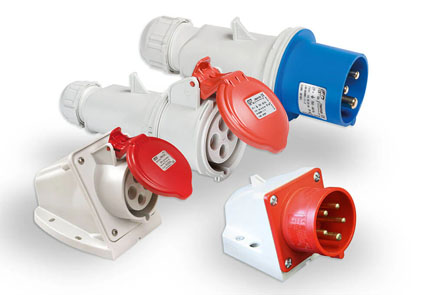Industrial plugs—designed for heavy-duty use, resistance to harsh conditions, and safe high-voltage connections—are not one-size-fits-all. Unlike standard household plugs, their IP (Ingress Protection) ratings, durability, and compatibility with industrial-grade equipment make them indispensable across sectors where reliable power is non-negotiable. Below, we break down the key industries that rely on industrial plugs, and why these specialized connectors are critical to their operations.

The manufacturing and automotive industries operate high-load equipment—from assembly line robots and CNC machines to welding tools and conveyor belts—that demands stable, high-amperage power. Industrial plugs excel here for two key reasons:
Durability: Models with reinforced casings (e.g., nylon or metal) withstand constant vibration, impacts, and exposure to lubricants or coolants—common in automotive factories. For example, a car assembly plant might use 3-phase industrial plugs (rated 32A or 63A) to power robotic arms, ensuring uninterrupted production.
Safety: Many industrial plugs for manufacturing meet IEC 60309 standards, featuring color-coded pins (e.g., blue for 230V, red for 400V) to prevent misconnection. This reduces electrical hazards in busy factories where multiple machines share power sources.
The energy sector—including power plants, wind farms, solar installations, and oil refineries—relies on industrial plugs to handle extreme conditions, from outdoor weather to explosive atmospheres:
Outdoor Energy Sites: Wind and solar farms use waterproof industrial plugs (IP67 or IP68 rated) to connect inverters, battery storage systems, and monitoring equipment. These plugs resist rain, dust, and temperature fluctuations (from -40°C to 80°C), critical for remote locations.
Hazardous Energy Zones: Oil refineries and natural gas plants require explosion-proof industrial plugs (ATEX or IECEx certified) to prevent sparks that could ignite flammable vapors. For instance, a refinery’s pipeline pump system might use flameproof industrial plugs to ensure safe power delivery.
Power Distribution: Utility companies use industrial plugs in substations to connect transformers and backup generators, with lockable designs to prevent unauthorized tampering.
Construction sites are dynamic, messy environments where power needs shift daily—making industrial plugs a necessity for tools and temporary setups:
Portability: Heavy-duty industrial extension cords with compatible plugs power portable tools like jackhammers, concrete mixers, and electric saws. Unlike household plugs, they handle frequent plugging/unplugging without wear.
Weather Resistance: Construction projects often proceed in rain, snow, or dust. IP65-rated industrial plugs keep water and debris out, ensuring tools like electric welders or lighting towers work safely in wet conditions.
Temporary Installations: For infrastructure projects (e.g., road building or bridge construction), industrial plugs connect temporary power boxes to site offices, security systems, and equipment—reducing the risk of electrical failures.
Logistics centers and warehouses depend on electric material handling equipment—forklifts, pallet jacks, and conveyor systems—that requires efficient, safe charging and powering. Industrial plugs address their unique needs:
High-Current Charging: Electric forklifts use industrial plugs (often 50A or higher) to charge quickly, minimizing downtime. Many warehouses opt for “fast-charge” industrial plugs that cut charging time by 40% compared to standard connectors.
Space Efficiency: Compact industrial plug designs fit in tight spaces, such as under forklift charging stations or alongside conveyor belts. Some models also feature rotating heads for easier connection in cramped areas.
Reliability: Warehouses operating 24/7 can’t afford power disruptions. Industrial plugs with corrosion-resistant pins ensure consistent connections for critical systems like automated storage and retrieval (AS/RS) machines.
Hospitals, clinics, and pharmaceutical labs require plugs that meet strict hygiene and safety standards—industrial plugs deliver on both:
Food and beverage plants face frequent washdowns with high-pressure water and sanitizers—standard plugs would short-circuit, but industrial plugs are built for this:
Washdown Resistance: IP69-rated industrial plugs withstand high-temperature, high-pressure cleaning (up to 80°C and 80 bar), making them ideal for dairy farms, breweries, and meat processing facilities. For example, a dairy plant uses these plugs to power milking machines and pasteurization equipment.
Corrosion Resistance: Stainless steel industrial plugs resist rust from constant exposure to water, chemicals, and food acids (e.g., in tomato processing plants).
Hygiene: Smooth, crevice-free designs prevent food particle buildup, helping plants comply with FDA and EU 10/2011 food safety regulations.
Mining, quarrying, and mineral processing operate in some of the harshest conditions on Earth—dust, moisture, and heavy impacts are daily challenges. Industrial plugs here are engineered for survival:
Dust & Water Protection: IP68-rated industrial plugs seal out coal dust, mine water, and mud, powering equipment like drill rigs, crushers, and underground ventilation systems.
Impact Resistance: Reinforced industrial plugs (with shock-resistant casings) withstand drops from mining vehicles or falling debris. Some models can handle impacts up to 10 joules—equivalent to a 1kg object falling 1 meter.
High-Voltage Compatibility: Mining operations often use 600V+ power systems; industrial plugs rated for these voltages ensure safe connection of large-scale equipment like ore conveyors.
While industrial plugs suit multiple sectors, selection depends on three factors:
Environment: IP rating for dust/water (e.g., IP67 for construction, IP69 for food processing).
Power Needs: Amperage (16A–125A) and voltage (230V–690V) to match equipment.
Compliance: Industry-specific certifications (e.g., ATEX for oil refineries, FDA for healthcare).
GET A QUOTE